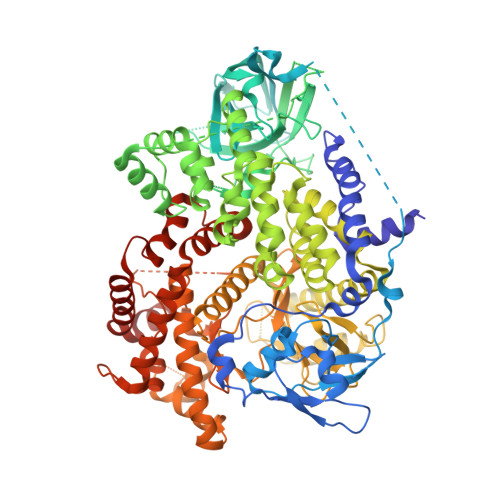Discovery, Optimization, and in Vivo Evaluation of Benzimidazole Derivatives AM-8508 and AM-9635 as Potent and Selective PI3K delta Inhibitors.
Shin, Y., Suchomel, J., Cardozo, M., Duquette, J., He, X., Henne, K., Hu, Y.L., Kelly, R.C., McCarter, J., McGee, L.R., Medina, J.C., Metz, D., San Miguel, T., Mohn, D., Tran, T., Vissinga, C., Wong, S., Wannberg, S., Whittington, D.A., Whoriskey, J., Yu, G., Zalameda, L., Zhang, X., Cushing, T.D.(2016) J Med Chem 59: 431-447
- PubMed: 26652588
- DOI: https://doi.org/10.1021/acs.jmedchem.5b01651
- Primary Citation of Related Structures:
5EDS - PubMed Abstract:
Lead optimization efforts resulted in the discovery of two potent, selective, and orally bioavailable PI3Kδ inhibitors, 1 (AM-8508) and 2 (AM-9635), with good pharmacokinetic properties. The compounds inhibit B cell receptor (BCR)-mediated AKT phosphorylation (pAKT) in PI3Kδ-dependent in vitro cell based assays. These compounds which share a benzimidazole bicycle are effective when administered in vivo at unbound concentrations consistent with their in vitro cell potency as a consequence of improved unbound drug concentration with lower unbound clearance. Furthermore, the compounds demonstrated efficacy in a Keyhole Limpet Hemocyanin (KLH) study in rats, where the blockade of PI3Kδ activity by inhibitors 1 and 2 led to effective inhibition of antigen-specific IgG and IgM formation after immunization with KLH.
- Department of Therapeutic Discovery, Amgen Inc. , 360 Binney Street, Cambridge, Massachusetts 02142, United States.
Organizational Affiliation:


















